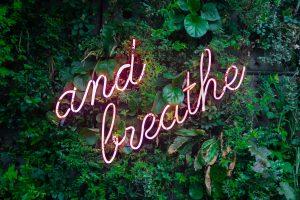
Anxiety can be a complicated thing, both in its origins and outcomes. From mild butterflies in the pit of our stomach, to retching and heaving over a toilet bowl—and a multitude of in betweens: a flushed face, stuttering and stumbling over words, racing thoughts, trembling knees, itchy rashes, sweaty palms and armpits—we all fall under anxiety’s grip from time to time. For some of us, anxiety’s hold never relaxes and we end up living with it day after day, sometimes for years, with crippling effects.
I posted in social media recently about celebrity star, Claire Foy—of the hit Brit drama, The Crown—and her lifelong struggle with anxiety. I mention it again to underscore how ubiquitous and far reaching anxiety is within the human experience. No one is exempt from it, no matter how gloriously together, cool and successful they may seem. I’m glad she talked about it in front of millions. People need to hear they are not alone in their suffering. It was a brave and vulnerable move on Foy’s part and hopefully it blazes a path for other sufferers to follow, instead of quietly languishing in perceived isolation.
Anxiety has many “fruits” as I have mentioned above, but its deepest roots are usually fear and shame—a core feeling or belief that we’ve missed the mark, we don’t measure up, we are not able or are dis-abled; that we are not in control (helpless), or that we are out of control (crazy).
Anxiety’s etiology may be long since forgotten, but the outworking of it remains present daily for many people, and can be triggered by situations or relationships where we feel stretched beyond our level of comfort or control. For some people, anxiety is triggered by food and drink, or drugs and medicine. Desperate for relief we seek solace in whatever promises us a little relief—the distraction of a hobby, work, an obsession, alcohol, sex, recreational drugs, pornography, shopping, gambling, engaging in risky behavior. Whatever false comfort will take our mind and body to a calmer place, we reach out and grab, only to find that the false comfort grabs us right back in a stranglehold, enslaving us to where we end up dealing with two problems: the anxiety and its “relief”.
True relief lies in feeling loved and accepted, unconditionally for who we are, apart from our performance. Once we find the comfort and consolation of a supportive and accepting community, family, friend group, therapist and or spiritual practice, we can truly begin to relax and find those deep, fear-fueled beliefs about ourselves begin to change. Some of us don’t have the luxury of that kind of support, but researchers are now discovering what Jesus and Buddha taught long ago— that loving oneself and others yields good returns. Being kind and accepting and gentle towards ourselves and others creates new neural pathways in the brain, and new ways of perceiving the world and our place in it.
Catch those self condemning and defeating thoughts about yourself and turn them into something positive. Instead of, you’re stupid/mean/not as good as___ (fill in the blank), tell yourself what you are good at, what people do seem to like or say about you. Remind yourself of things you have done well, even little things. Focus on the positive aspects of yourself and others. Smile at the snarky check-out clerk, be patient (take a deep breath) with that annoying coworker, offer to help that cranky family member in some practical way. The kindness we give out always comes back on us eventually, and the kindness and gentleness with which we approach ourselves lifts a tremendous burden from our experience of life.
It takes time, a little vulnerability and humility to learn to accept ourselves and others’ good estimation of us, but loving kindness planted as a seed eventually yields a harvest of fruit—and boy does it taste good. Anxiety’s fruit rots away in us, but loving acceptance produces sweet and lasting fruit for us to enjoy and share.
